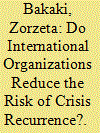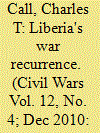| Srl | Item |
| 1 |
ID:
160480


|
|
|
|
|
| Summary/Abstract |
This paper examines the effect of international organizations (IOs) on the recurrence of international crises. In line with existing literature on conflict onset, I suggest that country-dyads with more co-memberships in IOs have a lower probability of fighting again. Moving beyond this claim, however, I argue that the scope and mandate of the IO are not relevant for the risk of crisis recurrence. Ultimately, all types of IOs promote links between states and strengthen their chances for effective international cooperation. Empirically, I examine the probability of crisis recurrence between 1950 and 2008, using the count of dyadic co-memberships as the main explanatory variable. The results show that co-membership in any type of IO has negative and significant impact on crisis recurrence. Moreover, the disaggregation of IOs into different categories (e.g., those dedicated to conflict prevention, peace-brokering, or security) also points to a negative effect. The effects of IOs disaggregated by type, however, are not significantly different from the overall IO impact.
|
|
|
|
|
|
|
|
|
|
|
|
|
|
|
|
| 2 |
ID:
101341


|
|
|
|
|
| Publication |
2010.
|
| Summary/Abstract |
Scholars of peacebuilding are increasingly moving beyond questions of how to reach negotiated settlements to how an apparently stable postwar peace can be consolidated. Liberia offers a good case study, as its civil war of 1990-96 seemed to have concluded with an internationally supported election in 1997 and the withdrawal of international peacekeeping forces. Yet it experienced renewed warfare involving many of the same actors by 2000. What explains the failure of Liberia's peace? Recent research on civil wars has emphasized the causal role of poverty, natural resource dependency, and weak state institutions. Although Liberia reflects many of these factors, I argue here that grievance and exclusionary behavior underlie Liberia's civil war recurrence. These findings suggest that national actors and international peacebuilders should focus strategies on addressing postwar elected governments' exclusionary conduct toward former enemies.
|
|
|
|
|
|
|
|
|
|
|
|
|
|
|
|
| 3 |
ID:
150989


|
|
|
|
|
| Summary/Abstract |
Once a set of civil war actors reach a final peace agreement, a number of different implementation sequences are possible as the negotiated provisions are put into practice. We focus on a key but threatening stepping stone in the post-accord period—the holding of the first post-accord election—which has the capacity to be a stabilizing or destabilizing force. We identify effective accommodation provisions that civil war actors can negotiate and implement before the first post-accord election to reduce the chances of renewed violence. Utilizing new longitudinal data on the implementation of comprehensive peace agreements between 1989 and 2012 and a series of survival models, we find that if the first post-accord election is preceded by the implementation of accommodation measures, elections can have a peace-promoting effect. However, in the absence of preelection accommodation measures, elections are much more likely to be followed by peace failure
|
|
|
|
|
|
|
|
|
|
|
|
|
|
|
|